Napoletana di origine, laureata in International affair presso la Johns Hopkins University, iscritta al Dottorato di ricerca in Human Right, Society and Multi-Level Governance dell’Università di Padova, si occupa di diritto alla salute, crisi economica e politiche pubbliche. Attualmente in missione per il dottorato, a Budapest presso l’European Central University, per aggiornamenti sulla metodologia per la ricerca specifica. Rossella De Falco, inoltre è un’affermata arpista e cantante. La musica è entrata a far parte della sua vita già da bambina, alimentandosi poi con gli anni.
“Ho iniziato all’età di 12 anni, suonando violino e piano, e contemporaneamente canto lirico frequentando poi il conservatorio di Avellino. Continuando con le note, mi sono innamorata, talmente tanto, dell’arpa celtica, da abbandonare tutto, concentrandomi unicamente su questo strumento. Fondamentale e decisiva, per la formazione, è stata la maestra francese Marianne Gubri che mi ha trasmesso, oltre all’insegnamento, la passione vera. I primi passi li ho mossi con lei e recentemente abbiamo suonato insieme in America, in Missuri e in Francia con Lyrae, un ensemble di arpe celtiche”.
Cosa le ha trasmesso l’arpa celtica, tanto da mollare tutto quanto fatto fino a quel momento?
“Sono sempre stata appassionata del mondo celtico. Un mondo fatto di fate, elfi e leggende per cui mi sono avvicinata, in tal senso, scoprendo anche l’arpa celtica e il piacere che provavo a suonarla e l’emozione nel pizzicare le sue corde mi ha fatto letteralmente innamorare”.
L’arpa celtica, si distingue da quella classica per alcune peculiarità: senza pedali e costituita da chiavi e corde. Nelle credenze celtiche rappresentava un simbolo di potenza, quindi, i suoi possessori erano re, maghi e guerrieri. Molti si facevano seppellire con la propria arpa credendolo uno strumento per connettersi all’aldilà. L’arpa è considerata anche lo strumento degli angeli, grazie alla quale annunciano la loro presenza. Inoltre, le vengono attribuiti poteri straordinari. Simbolo di armonia ed è lo strumento a corde per eccellenza, accarezza l’anima e le vibrazioni echeggiano nell’aria come un canto libero.
Ma quale repertorio si può ascoltare da Rossella De Falco?
“Suono prevalentemente musica celtica, che vuol dire musica scozzese, bretone, gallese e irlandese, ballate medioevali, ma anche cover di cantautori italiani e canadesi, come Loreena McKennit, icona della musica celtica, world music, musica araba, canzoni napoletane, che si può concretizzare in folk popolare”.
Si può assistere ad una esibizione da solista o in formazione con altri elementi?
“Mi esibisco sia da sola, in chiave arpista o arpista cantante, oppure ho un mio gruppo che vede, oltre me, un flautista ed il mio fidanzato, Andrea Tallone, anche lui arpista e cantante. Insieme stiamo lavorando per la composizione di pezzi inediti”.
La maestra De Falco, essendo napoletana, conosce l’isola azzurra, ed h tenuto anche dei concerti, sia per il comune di Capri, nella cattedrale di Santo Stefano che, sia durante un evento alla Canzone del Mare, lo scorso luglio.
Cosa pensa dell’isola, c’è un posto che porta nel cuore?
“Capri è il mio luogo dell’anima, la adoro dalla prima volta che l’ho vista, a quattordici anni. Per me è un luogo magico, un posto mistico, legato a dei ricordi indelebili dell’infanzia, e quando sono ritornata per i concerti devo dire che è stata una riscoperta meravigliosa”.
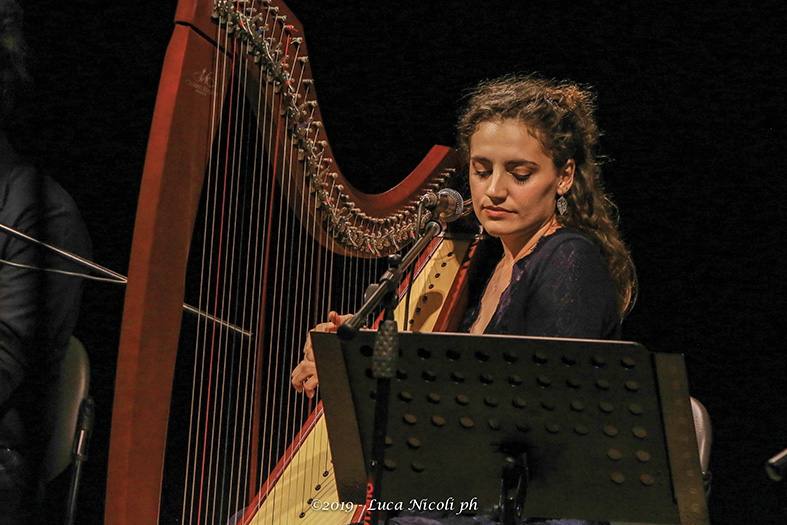
Neapolitan origins, graduated in International Affairs at the Johns Hopkins University, PhD student in Human Right, Society and Multi-Level Governance at the University of Padova, she works on right to health, economic crisis and public policies. Currently on a mission for her PhD, in Budapest, at the European Central University, for updates on research methodologies. Rossella De Falco is also a successful harpist and singer. Music has been part of her life ever since she was a child and was during the years this passion was fueled.
“I began when I was twelve, I played the violin and the piano, and at the same time studying opera singing, at the conservatory of Avellino. Following the musical notes, I fell in love with the Celtic harp so deeply, that I gave up on everything else and focused exclusively on this instrument. Fundamental and determining for my education, was the French teacher Marianne Gubri who transmitted me, other than the teachings, the true passion. I took my first steps with her, and recently we played together in America, in Missouri and in France, with Lyrae, an ensemble of Celtic harps”.
What did the Celtic harp mean to you, so much that you gave up on everything you had worked on until that moment?
“I’ve always been fascinated by the Celtic world. A world made of fairies, elves and legends, and in this sense, when I approached this world, I discovered the Celtic harp as well. The joy I felt playing it and the emotion in plucking its strings made me literally fall in love”.
The Celtic harp is different from the classic one for certain features: it has no pedal and made up of key strings. In Celtic lore it represented power, so its owners were kings, mages and warriors. Many were buried with their harps, believing it was an instrument to communicate with the afterlife. The harp is also considered the instrument of angels, its music announcing their presence. Symbol pf harmony, it is the stringed instrument par excellence, it strokes the soul and its vibrations reverberate in the air as a free song.
Which is the repertoire of Roberta De Falco?
“I mainly play Celtic music, that is, Scottish, Breton, Welsh, Irish music and medieval ballads, but I also play arrangements of Italian and Canadian singers-songwriters (like Loreena McKennit, an icon of Celtic music) world music, Arab music, Neapolitan songs and popular folk”.
Do you perform solo or in formation with other players?
“I perform both solo, as harpist player and singer, and in my own group which is formed by, other than me, a flautist and my boyfriend, Andrea Tallone, who is a harpist and singer as well. Together we are composing original tracks”.
De Falco is Neapolitan, so she knows the blue island, where she has also held concerts, for the Town of Capri, in St Stephen’s Cathedral and during an event at “Canzone del Mare”, last July.
What do you think of the island, is there a place you keep in your heart?
“Capri is my place of the soul, I’ve loved it ever since my first visit, when I was fourteen. For me, its’ a magical, mystical place, tied to unforgettable childhood memories. When I came back here for the concerts, I must say it was a wonderful rediscovery”.

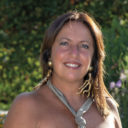
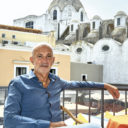
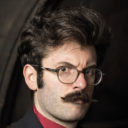


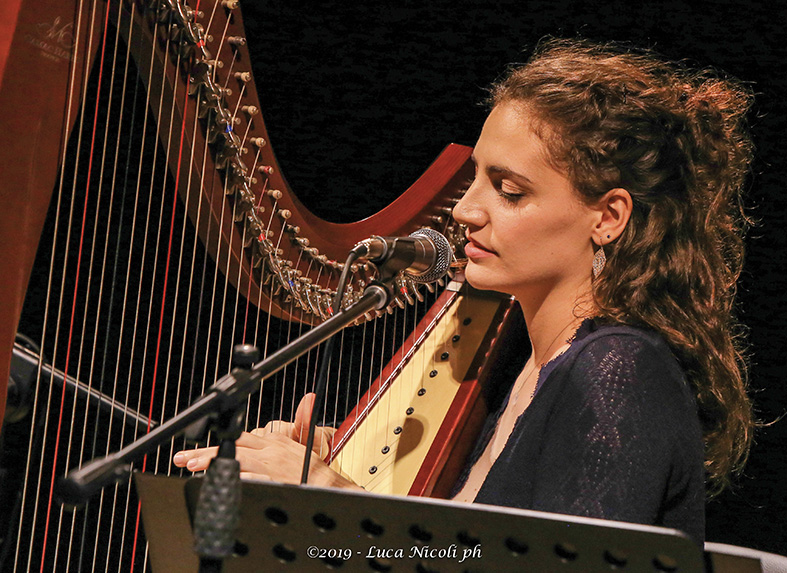
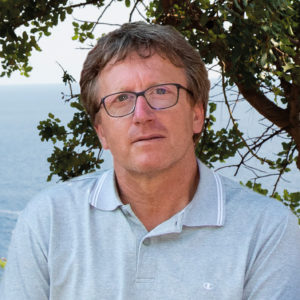
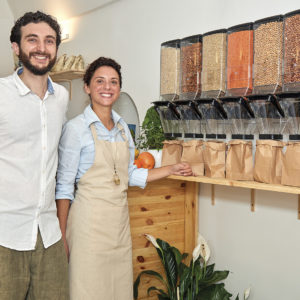
No Comments